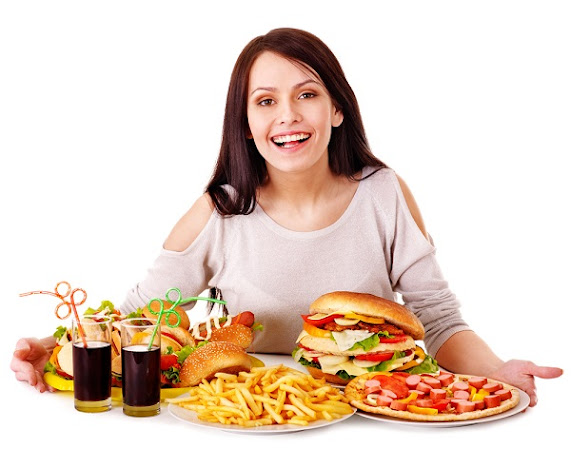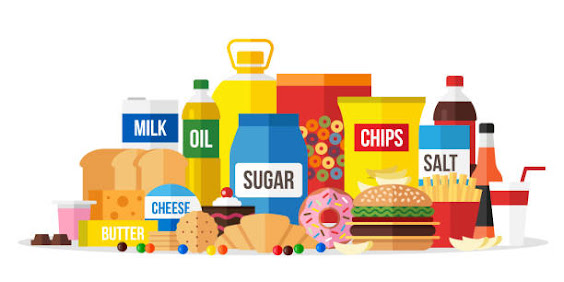Foods That Will Result
In Your Weight Gain
Note: Friends, if you want to read this article in any other language, please change the language from the translate button at the top of this article.
Overview
Friends, there are several types of foods that can contribute to weight gain.
If you want to avoid weight gain, you should control your intake of these foods and if you wish to gain weight, you should increase the intake of these foods.
Foods That Will Result In Your Weight Gain
👉 High-calorie foods:
 |
| When you consume more calories than your body needs for energy, the excess is stored as fat |
Foods that are high in calories, such as sugary drinks, fast food, fried food, and processed snacks, can lead to weight gain if consumed in excess.
When you consume more calories than your body needs for energy, the excess is stored as fat.
Consuming high-calorie foods regularly can result in a calorie surplus, which means you're consuming more calories than your body needs for energy, leading to weight gain over time.
👉 Foods high in sugar:
Foods high in added sugars, such as candy, cookies, and sweetened drinks, can contribute to weight gain.
When you consume foods high in sugar, your blood sugar levels spike and your body releases insulin to help bring them down.
Over time, high insulin levels can lead to insulin resistance and weight gain.
Consuming foods high in sugar can lead to weight gain in several ways. First, sugary foods often lack important nutrients and fiber, meaning they can leave you feeling hungry and craving more food.
Additionally, consuming too much sugar can lead to insulin resistance, which can interfere with your body's ability to burn fat, leading to weight gain.
👉 Foods high in fat:
Foods that are high in fat, such as cheese, butter, and fried foods, can be high in calories and contribute to weight gain if consumed in excess.
Foods that are high in fat can be calorie-dense, which means they contain a lot of calories in a small portion.
Consuming too many high-fat foods can result in a calorie surplus, leading to weight gain.
Additionally, some types of fat, such as trans fats, can contribute to inflammation, which can increase the risk of obesity and other health issues.
👉 Processed foods:
Processed foods, such as packaged snacks, frozen meals, and fast food, are often high in calories, added sugars, and unhealthy fats, and can contribute to weight gain if consumed frequently.
Processed foods are often high in calories, added sugars, and unhealthy fats. Consuming these foods regularly can lead to a calorie surplus, leading to weight gain.
Additionally, processed foods are often high in sodium, which can lead to water retention and bloating.
👉 Alcohol:
Alcohol is high in calories and can contribute to weight gain if consumed in excess. Additionally, alcohol can stimulate appetite and lead to overeating.
Consuming alcohol can lead to weight gain in several ways. Alcohol is high in calories and can contribute to a calorie surplus.
Additionally, alcohol can stimulate appetite, leading to overeating. Finally, alcohol can interfere with your body's ability to burn fat, leading to weight gain.
👉 Carbohydrates:
Carbohydrates are an important macronutrient and are found in foods such as bread, pasta, rice, and potatoes.
However, consuming too many carbohydrates, especially refined carbohydrates such as white bread and sugary cereals, can lead to weight gain.
This is because excess carbohydrates are stored as glycogen in the muscles and liver, and any excess is converted to fat and stored in adipose tissue.
Additionally, consuming too many refined carbohydrates can lead to spikes in blood sugar, which can lead to insulin resistance and weight gain.
👉 Portion sizes:
Even healthy foods can contribute to weight gain if consumed in large portions. Consuming more calories than your body needs, regardless of the source, can lead to weight gain.
It's important to pay attention to portion sizes and practice mindful eating to avoid overeating.
👉 Late-night snacking:
Late-night snacking often involves consuming high-calorie, high-fat, or high-sugar foods, which can contribute to weight gain.
Eating late at night can lead to weight gain because your body is less active during this time and therefore burns fewer calories.
It's important to note that weight gain is a complex issue and can be influenced by a variety of factors, including genetics, lifestyle, and medical conditions.
While certain foods may contribute to weight gain, it's important to focus on overall healthy eating habits and a balanced diet rather than demonizing specific foods.
Moderation is key, and consuming these foods in moderation as part of a balanced diet can still be part of a healthy lifestyle.
Frequently Asked Questions About Foods That May Result In Your Weight Gain
Here are some frequently asked questions about foods that may cause weight gain:
Q: Are all high-calorie foods bad for weight management?
A: Not necessarily. Some high-calorie foods can be healthy and nutrient-dense, such as nuts, avocados, and fatty fish.
However, consuming high-calorie foods in excess can lead to weight gain. It's important to pay attention to portion sizes and balance higher-calorie foods with lower-calorie options to maintain a healthy weight.
Q: Is it okay to consume carbohydrates if I want to lose weight?
A: Yes, carbohydrates are an important source of energy for the body and can be included in a healthy weight loss diet.
However, it's important to choose complex carbohydrates, such as whole grains, fruits, and vegetables, and avoid refined carbohydrates, such as white bread and sugary cereals.
Additionally, it's important to pay attention to portion sizes and balance carbohydrates with other macronutrients, such as protein and healthy fats.
Q: Can I still consume processed foods if I'm trying to lose weight?
A: It's best to limit processed foods if you're trying to lose weight, as they are often high in calories, added sugars, and unhealthy fats.
However, it's okay to consume processed foods in moderation as part of a balanced diet.
When choosing processed foods, look for options that are lower in calories, added sugars, and unhealthy fats.
Q: Is it okay to consume alcohol if I want to lose weight?
A: Consuming alcohol in moderation is okay if you're trying to lose weight. However, it's important to be mindful of the calories in alcoholic beverages, as they can add up quickly.
Additionally, alcohol can stimulate appetite, leading to overeating, and interfere with your body's ability to burn fat.
Q: Can I still consume sugary foods if I'm trying to lose weight?
A: It's best to limit sugary foods if you're trying to lose weight, as they can lead to insulin resistance and weight gain.
However, it's okay to consume sugary foods in moderation as part of a balanced diet.
When choosing sugary foods, look for options that are lower in added sugars and higher in nutrients, such as fruits.
Q: How can I avoid late-night snacking?
A: To avoid late-night snacking, try to consume your last meal of the day at least a few hours before bedtime.
Additionally, make sure you're consuming enough calories and nutrients throughout the day to avoid feeling hungry at night.
If you do feel hungry, reach for a healthy snack, such as fruits or vegetables, instead of high-calorie, high-fat, or high-sugar options.
Friends, Stay Fit, Stay Happy
--------------------------------------------------------
Friends, if you liked it, please share it with your friends.
SHARING IS CARING.
Compiled by: Paramjit Singh Rana







Comments
Post a Comment